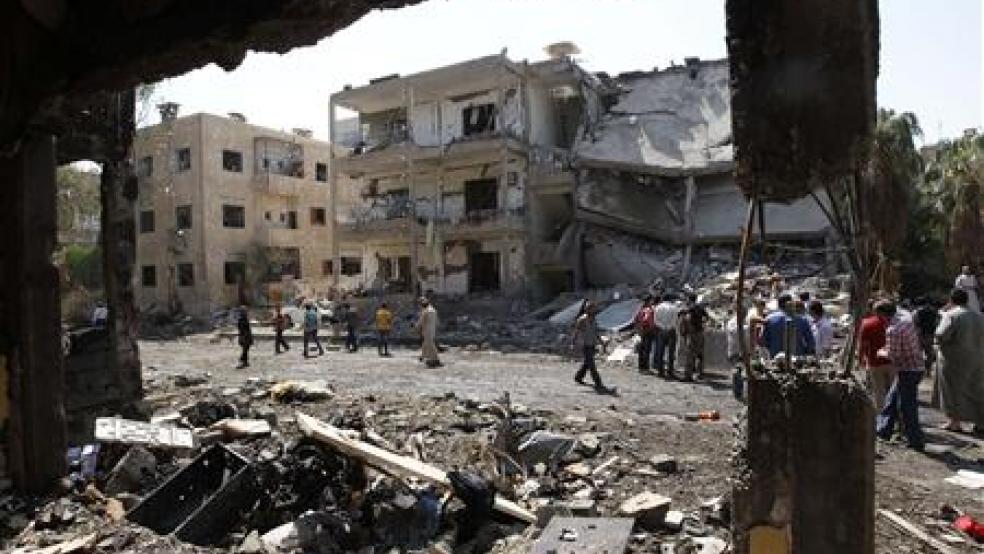WASHINGTON (Reuters) - Obama administration officials have contacted energy experts in recent days to discuss oil market conditions as the president weighs a military strike against Syria, sources familiar with the matter told Reuters.
There are no signs the government is preparing to tap emergency oil reserves soon in a bid to tame rising prices, according to the sources who spoke with Reuters this week, though the administration is closely monitoring the situation.
Fears about Syria's civil war spilling over into other countries have helped propel international oil prices to their highest level in six months, rising more than $8 a barrel since the beginning of the month, and approaching a level that has slowed the global economy in the past.
That has spurred early market chatter about whether Obama might tap the Strategic Petroleum Reserve, or SPR, a 700 million barrel resource last used in 2011 after months of supply disruptions during the Arab Spring.
"I don't think a use of the SPR is either imminent or being strongly considered at this time," said one source who had spoken with administration officials as part of regular discussions with them about oil markets.
"It probably wouldn't be unless the blowback from any strikes on Syria is more severe than anticipated," the source said.
Oil analysts have said a quick strike against Syria could push prices up to $125 to $130 a barrel, with Societe Generale saying prices could reach $150 a barrel if the crisis were to spill over into larger oil producing countries.
Energy markets are already nervous because of major supply disruptions in Libya, where armed groups and labor strikes have caused crude exports to be cut to their lowest level since the 2011 civil war.
A UK official also said a strategic oil release, which would be coordinated by the International Energy Agency (IEA), was not on the radar in London, despite elevated oil prices.
The Paris-based IEA, with which the Obama administration coordinated on a sale of 60 million barrels of U.S. and European reserves in 2011, said on Thursday the rise in oil prices this month does not call for a response, but that the agency stands ready to respond, "in the event of a major supply disruption.
NOT IMMUNE FROM SPIKES
President Barack Obama has made it clear that he plans to hold the Syrian government responsible for a chemical weapons attack last week that killed hundreds of civilians in a Damascus suburb. A missile strike is among the options being considered by the Obama administration.
"I have no interest in any open-ended conflict in Syria, but we do have to make sure that when countries break international norms on weapons like chemical weapons that could threaten us, that they are held accountable," Obama told PBS Newshour in an interview on Wednesday.
Even though the United States is in the midst of its biggest oil drilling boom in decades, with production at the highest level since 1997, prices would still likely spike if there was a major supply disruption in the Middle East.
The North Sea Brent crude benchmark that helps set the majority of world oil prices traded around $114 per barrel on Thursday, near the $120 level that analysts say could push the White House to begin considering using the SPR.
An administration official, speaking on background, declined to comment specifically on how closely it was watching oil prices.
"We are continuously monitoring the global oil supply and demand situation," the official said.
READY TO RESPOND
Syria has not exported any oil since late 2011, when international sanctions came into force. Prior to the sanctions Syria produced 370,000 barrels per day (bpd), roughly 0.4 percent of global supplies, and exported less than 150,000 bpd, mainly to Europe.
But there are concerns that a U.S. strike could cause the Lebanese militant group Hezbollah, which is backed by Iran and has been involved in fighting in Syria, to carry out retaliatory attacks in Turkey, Jordan, or oil-producing Iraq.
One of the sources who has spoken with U.S. officials said there is a concern that Iran, which has supported Syrian President Bashar al-Assad, may walk away from talks on its disputed nuclear program.
The unpredictability of what action the United States will take, and what happens afterwards, has helped push markets higher, said Charles Ebinger, head of the energy security initiative at the Brookings Institution.
Ebinger said he had not heard anyone in Washington talking seriously about tapping strategic reserves, but he said that could change quickly if a price jump of $15 to $20 a barrel threatened to stall the economic recovery.
"I'm sure if the market got too jittery, we'd try to do it," he said.
(Additional reporting by Matthew Robinson and Joshua Schneyer in New York and Peg Mackey in London; Editing by Toni Reinhold)


